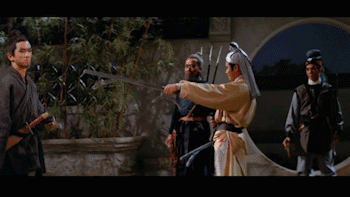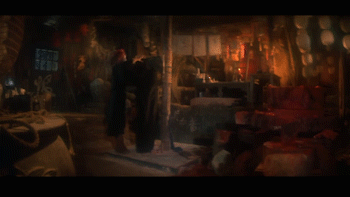Jeremy Bai, one of the authors of the Righteous Blood, Ruthless Blades: Wuxia Roleplaying, is back on the blog to look at some of the potential challenges that GMs may face. This article also appeared on his blog, along with several others!
All game systems come with unique challenges, and Righteous Blood, Ruthless Blades is no exception. In this article, I will talk about a few aspects of the game that could be difficult for a GM to deal with if they arise unexpectedly. Please note that these are my personal musings, and don't reflect the opinion of Osprey or my co-author Brendan Davis.
**
Challenge: Perfectly Matched Opponents
Background: Because of the vast number of combinations possible when it comes to Signature Abilites, Counters, Weapons, etc., and when you throw in the ramifications of Resist, its feasible for two opponents to be so evenly matched that they can't hit each other, or at least, can't damage each other. Although our primary goal for RBRB was for combat to be fast and gritty, the idea of two opponents being perfectly matched is actually a common genre trope. If you've watched or read much wuxia, you've surely encountered this classic plot element. Below is a scene from Brotherhood of Blades (2002) in which one character can't beat another because of lacking training in certain moves (keep an eye on the subtitles to pick up on that point).
Solutions: If a fight breaks out and a few rounds pass in which no one is hit or injured, and it seems likely to continue that way, have the NPC attempt to end combat and start a conversation. If the PCs refuse to allow that, allow for a "cut scene" to occur mid-combat. Either way, have the NPC issue a challenge to the player(s) to meet again for a duel at a later date (presumably allowing the NPC time to train and reach a higher level, acquire a more powerful weapon or Signature Ability, or hatch some plot to win, possibly in an underhanded way). Of course, this will also give the PCs plenty of time to prepare as well. Make sure the time and place of the duel are formally agreed upon. Maybe even have the participants swear an oath. If there were witnesses present, allow them to spread the news. Or perhaps the antagonist can announce the duel to the Jianghu; this ensures that, if the PCs renege, they will lose face and become a laughingstock. The duel could take place the following month. It could be in a year or even ten years. It all depends on the situation. This sort of challenge is commonly seen in wuxia. Not every on-screen example is perfectly analogous, but the concept can be found in films such as Magic Blade (1976), Crippled Avengers (1978), or Reign of Assassins(2000), or Jin Yong's classic novel Legend of the Condor Heroes.
**
Challenge: Uniquely Specific Signature Abilities, Counters, Weapons
Background: Many of the Signature Abilities, Counters, Weapons, etc. in the game are only useful in very specific circumstances. For instance, Meridian Transposition is only helpful when fighting opponents with Internal Arts or acupoint attacks. Engulfing Wings of the Night Sky only defends against ranged attacks. And Fan of Dragon's Breath is essentially useless unless used against multiple opponents. In all of these cases, it would be simple, intentionally or by accident, to completely nerf a player character. In a scenario in which the players infiltrate a clan that only uses External Arts, a player with Meridian Transposition would quickly be frustrated by the fact that their main character's hook is pointless. If that clan only fights with melee weapons, and the character uses Engulfing Wings of the Night Sky, they would be even more ineffective. And if the character's weapon is Fan of Dragon's Breath, and every encounter features a single opponent, they might feel so useless they would rather create a new character for the scenario. Because Righteous Blood, Ruthless Blades does not allow for players to build up a huge catalog of martial arts skills, the tools at their disposal are often limited.
Solutions: There are different schools of thought in RPGs regarding how GMs should set up encounters, adventures, and campaigns. Some believe that in-game scenarios should be created without consideration for the player characters' specific talents, abilities, etc, lest the game seem contrived. Although I generally agree with this, in wuxia, there is a huge emphasis on dramatic plot twists and unexpected, exciting developments. Further, the character-driven nature of the stories usually involves the protagonist(s) having or developing some sort of unique advantage over their opponents. Because of this, my philosophy for RBRB is that GMs should cater at least somewhat to the player characters. Allow players to emulate those exciting moments from wuxia stories in which the protagonists' abilities allow them to pull off a "plot twist" on the NPCs.
For example, in the above scenario, perhaps this clan of External practitioners has hired an Internal Arts master as a bodyguard or enforcer. Maybe they have powerful weapons that target meridians, or set up some traps with flying darts. Maybe their headquarters has a room populated by sleeping guards that could result in a larger melee battle.
This concept is key to wuxia. For instance, in the novel version of Gu Long's Heroes Shed No Tears, the protagonist's understandings of the secret function of a powerful weapon, and the antagonist's lack of understanding, plays a key role in one of the biggest twists in the novel. And in the classic One-Armed Swordsman (1967), the protagonist's new martial arts ability perfectly takes advantage of a weakness in the enemy's special weapon, allowing for a dramatic comeback in Act 3 of the movie. See below for a taste.
I'm not suggesting that GMs contrive encounters that are blatantly designed to allow specific player characters to prevail. However, having personally been in situations where my character is absolutely useless for multiple game sessions in a row, I know the pain of dealing with a GM who doesn't cater to the players in some way. And if you're a GM who intentionally refrains from including challenges that the player characters can solve using their characters, well... I'm not sure how long your game group is going to last. In any case, my biases are in favor of providing exciting and fulfilling in-game moments for the players, even if that means sacrificing a bit of "realism" behind the GM screen. Besides, a good GM should be able to make that "lack of realism" seem more like an amazing plot development that will leave players hungering to play again.
Challenge: Problems with Fire Deviation Eccentricities
Background: In my experience, Fire Deviations can be one of the most entertaining aspects of the game. However, a few challenges can arise with them.
The first comes with players who intentionally accumulate a lot of them. For instance, a player might put 0 points into Meditation, ensuring that they almost always fail to level up without experiencing Fire Deviation. On top of that, they can then exercise their right to intentionally experience Fire Deviation to gain additional Signature Abilities. The result can be a player with multiple Fire Deviations, (as many as 12 if my math is correct). Many times, this will result in them acquiring numerous roleplay-centric Eccentricities that are conflicting or, at the very least, difficult to manage simultaneously. For instance, what if a player who has a fear of blood develops the requirement of drinking five catties of human blood daily? What happens if the character becomes chivalrous and honor-bound, but at the same time, develops the obsession to kill an innocent person once a month. Granted, roleplaying such conflicted characters could be great fun for some people, but for others, it could be so difficult as to drain any fun out of the game.
The second challenge is that some Fire Deviation Eccentricities require significant work on the side of the GM. For instance, to effectively include nightmares or hallucinations in a meaningful way will take even an experienced GM a good amount of forethought and preparation. And other Eccentricities that might not be in the control of the GM will require the GM to react quickly and realistically to what could be very erratic or even crazed behavior. For example, what if your campaign is intrigue-heavy and has the characters infiltrating the imperial palace, but then your party's Internal Arts expert acquires the Mental Affliction that turns them into a murderous beast if they use Internal?
Solutions: My first suggestion is to discuss this subject with your players before starting your campaign. If you're an experienced GM playing with experienced players, you might let the sky be the limit and just see what crazy characters your players end up with. But if you're a less-experienced GM with newer players, you might want to put some limitations in place. For example, you could institute a house rule that players must put at least one point into Meditation if they plan to add additional Signature Abilities by taking Fire Deviations. Or you could create limitations to how many Mental Afflictions are allowed (these are generally the ones that involve skill with roleplaying and acting). Although there is a rule to re-roll Fire Deviations that don't make sense, you might also want to define how strictly you plan to apply that rule. Regardless of the specific way you handle your in-house rules, it's best to consider the issue and come up with a plan before jumping into a campaign.
A secondary suggestion is to arrange your sessions so that leveling up (and by extension acquisition of Eccentricities) happens at the end of game sessions, or between sessions if you want to skip the excitement of the Meditation rolls. Either way, avoid leveling up at the beginning of a session, as whatever planning your put into the game could be thrown out the window if a player acquires the right (or wrong) Fire Deviation.
For inspiration regarding Fire Deviations, you could check the many incarnations of Jin Yong's Return of the Condor Heroes, in which the antagonist from Legend of the Condor Heroes, Ouyang Feng, returns having gone insane after practicing a powerful martial art incorrectly. Another great depiction of a psychotic martial artist is in the wuxia horror flick Human Lanterns (1982). Although the character is the antagonist, and isn't explicitly said to have gone insane because of Fire Deviation, the legendary Lo Lieh does a great job at portraying a mentally deranged wuxia masked killer. See below for a taste... if you dare.
**
If you don't have the game already, you can pick it up on Osprey's website, DriveThruRpg, Amazon, or just about anywhere else that sells books. As usual, feel free to reach out to me if you have questions or comments, my social media links are at the bottom of this page. For more information about me and my work, check out my website.
Twitter - Facebook - Instagram - Website - Pinterest - Email List





Comments
You must be logged in to comment on this post. Click here to log in.
Submit your comment